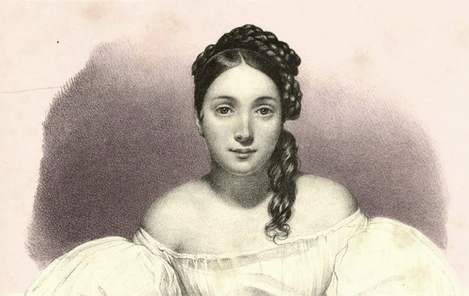
The following letter was written to Victor Hugo by his mistress Juliette Drouet. The two began their affair in 1833 after the production of Hugo’s play, Lucrezia Borgia, in which Drouet played the lead role of the murderous Princesse Négroni. At the time Hugo, after discovering the betrayal of his wife and childhood friend, Adèle, had fallen into an emotional recession. Already prone to fits of melancholy, he began to doubt the framework of his spiritual and ontological views. Drouet, with a penchant for the melodramatic, apparently provided the perfect antidote to Hugo’s ruined conception of romantic love. He would come to practice many of his half-religious, half-philosophical theories on his mistress, forcing her to adopt a state of abject poverty in what he called “the marriage of escaped birds.” When Drouet complained that she had nothing to do in her monastic apartment in Les Metz, Hugo encouraged her to write “everything that made her heart beat.” Drouet followed his advice; she wrote over 20,000 notes, most of which were left for Hugo in the hollow of an old chestnut tree. They remained lovers until Drouet’s death in 1883.
November 1st, 1839.
Good-morning, my dear little beloved, my darling little man. You told me so definitely yesterday that my handwriting was hideous, and my scrawl nothing but a horrible maze in which you lose both patience and love, that I hardly dare write to you to-day, and it would take very little to make me cease our correspondence altogether. We must have an explanation on this subject, for it is cruel of you to force me to make myself ridiculous night and morning, simply because I love you and am the saddest and loneliest of women. If my love must be drowned in my ignorance and stupidity, at least do not force me to make the plunge myself.
There was a time when you would not have noticed the ugliness of my writing; you would only have read my meaning and been happy and grateful. Now you laugh, which is shabby and wicked of you. This seems to be the fate of all the Quasimodo of this world, moral and physical; they are jeered at: form is everything, spirit nothing. Even if I could constrain my crabbed scrawl to say, “My soul is beautiful,” you would not be less amused. Therefore, my dear little man, pending the moment when I can join in the laugh against myself, I think it would be as well to suspend these daily writings. Besides, the moment has come when I must turn all my time and energies towards making my position secure. Nothing in this world can turn me from my purpose, for it is to me a question of life and death…
I count upon you to help me, my beloved. I am asking you for more than life—for the moral consummation of our marriage of love. Let me go with you wherever my happiness is threatened, let me be the wife of your mind and heart, if I cannot be yours in law. If I express myself badly, do not scoff, but understand that I have a right to put into words what you yourself have felt, and that I insist upon defending myself against all those women who get at you under pretext of serving you. I will have my turn, for I love you and am jealous.
J.
Later that same day:
You are good, my adored one, and I am a wretch. But I love you while you only permit yourself to be loved; that is what makes you so tranquil and me so bitter. My heart is weighed down by jealousy this evening and nothing less than your adored presence will suffice to calm me. I carry hell and all the furies within my soul. I wish I could be sewn to the lining of your coat tonight. I feel I am about to encounter some great danger that I can only defeat by not leaving your side. If my fears are well-grounded, I shall probably fail in averting the doom that threatens me, for you will not be able to stay with me all the evening. The compliments and flattery you will receive will take you from me. I cannot deny that I am unhappy, and would much rather be with you at Fontainebleau, at the Hôtel de France, than in Box C. of the Théâtre Français, even when Marion de Lorme is being played.
Kiss me, my little man. You were very sweet in your new greatcoat, but you had not told me you had been to your tailor. I shall keep up with you by sending for my dressmaker. I do not mean to surrender to you the palm for smartness and dandyism…
Juliette.
From: Juliette Drouet’s Love-letters to Victor Hugo. Edited by Louise Guimbaud. Translated by Lady Theodora Davidson. London: Stanley Paul & Co. (1915).
FURTHER READING
A biographical sketch of Drouet.
A history of Hugo’s literary production.


